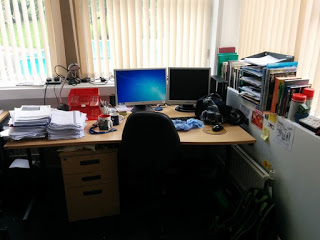I am Benjamin Bowman and This is How I Work
 Today, I have the pleasure of interviewing Benjamin Bowman in the “How I Work” series. Benjamin is a PhD student working on young people’s politics in the UK. He’s interested in how everyday life and young people’s everyday lives influence the ways they develop their own ways of thinking about politics and doing politics. He submitted his thesis in May. He told me that this has been a big year for him because he has been teaching full time while writing up, and became a father for the first time in August, so he wanted to contribute his experiences to PhD Talk about parenthood and PhD work.
Today, I have the pleasure of interviewing Benjamin Bowman in the “How I Work” series. Benjamin is a PhD student working on young people’s politics in the UK. He’s interested in how everyday life and young people’s everyday lives influence the ways they develop their own ways of thinking about politics and doing politics. He submitted his thesis in May. He told me that this has been a big year for him because he has been teaching full time while writing up, and became a father for the first time in August, so he wanted to contribute his experiences to PhD Talk about parenthood and PhD work.
Current Job: Teaching Fellow in Comparative Politics
Current Location: University of Bath
Current mobile device: Google (LG) Nexus 5
Current computer: Samsung something-or-other laptop, it was a donation from a friend!
Can you briefly explain your current situation and research to us?
I am marking dissertations and essays, hoping to get a contract for next year, and invigilating exams. It’s a busy time of year.
In my research, I am hoping to get a few articles published out of my thesis work. I also have a book forthcoming with Routledge on political theory, and I’m also part of a nationwide project interviewing students about the UK-EU referendum.
What tools, apps and software are essential to your workflow?
I use Google stuff because they all speak to each other reliably. Google calendar syncs well between my phone and my partner’s phone, so we know where each other are.
Zotero and NVivo got me through my PhD and I recommend them to students, too.
In teaching, I’ve really enjoyed using clickers to wake up lectures and get students engaged. My University subscribes to a provider called TurningPoint, but I know there are others out there.
At the end of my writing up, my thesis (and my students) started to dominate all my waking life and I used an app called (offtime) to basically disable my phone outside working hours, so that I wasn’t getting email notifications or re-reading supervisor comments all day and all night.
When my kid was younger we also used a phone app called Feed Baby Pro to track his feeds and sleeping, so I could take over when I got home. It was really useful for being able to know what is going on when you’ve had three hours sleep and a full day’s work, and you’re probably too tired to spell “nap” but still need to know when the next nap is scheduled…!
What does your workspace setup look like?
I have a desk at the University where I keep all my books, meet students and work on campus. It’s in an office I share with three other teaching fellows, but we get along great so it works out.
At the moment there’s no teaching and hardly any students need to meet me, so I work from home when I can. Working at home makes it a lot easier to eat lunch with my kid, to change him and make my partner coffee, and so on. It also cuts down on my travel time.
What is your best advice for productive academic work?
Keep working hours, and if you’re not in working hours, don’t work. Like, at all.
If there’s a job you can do that takes less than 5 minutes, do it straight away.
And finally – don’t be afraid to leave emails until later.
How do you keep an overview of projects and tasks?
I keep a spreadsheet of all my projects and a to-do list of the tasks I have to do, and I keep both on my Google drive so that it doesn’t matter whether I’m in the office or at home, they’re synchronized.
Besides phone and computer, do you use other technological tools in work and daily life?
I use clickers in lectures, and a USB presentation controller so I can walk around during a lecture without losing control of the slides. I also have a voice recorder that I use for my fieldwork.
Which skill makes you stand out as an academic?
I like to think my research and my teaching share those spaces with other people as equals. I want participants in my research and students in my lectures to feel like I respect them, and that the process we’re in together is less like me writing the music and more like a collaborative remix. I use participant digital photography in my research a lot for this reason. Having a photograph that you took yourself is a great way in my experience to say to someone, “I’m the expert in this”, and in my research I want exactly that, for my participants to be the experts in their own lives.
What do you listen to when you work?
When I’m grading students’ work there are a few things I like to listen to. Old 80s-90s hip-hop like A Tribe Called Quest or Slick Rick. I grew up listening to funk around the house so I listen to a lot of George Clinton, Parliament, Bootsy Collins, Rick James and Prince when I want to feel at home. The other side of music I like is really heavy metal like Sunn 0))) or one of the spin-offs, like Thorr’s Hammer, or something similar like Electric Wizard or Acid King. That stuff is good for a tall pile of essays.
For just everyday work I like to put on a 90s radio station or my Spotify playlist, which is more varied.
What are you currently reading? How do you find time for reading?
Meg and Mog, and Judith Kerr! I read to my kid every night and sometimes during the day too, if he wants. If he really needs to sleep we are about halfway through Treasure Island. When he was a tiny baby I used to read him Moby Dick or the sports section of the paper, which would put him to sleep.
Reading for myself – I haven’t really done that since I started writing up. I get to the end of the day and just want to check out. But I’ll get back into it in the autumn. I have a stack of books waiting for me!
Are you more of an introvert or extrovert? How does this influence your working habits?
I’m an extrovert so I have to socialize in order to feel like I’ve done anything at all. I talk to my colleagues a lot about football or just go shoot the breeze with the other PhD students in the student office. Throughout my PhD I worked really hard to build and maintain little social groups: a seminar series in the Department, a student-run journal at our regional doctoral training centre, student conferences and so on. It’s really vital that PhD students communicate with each other because we need to build our own communities most of the time.
What’s your sleep routine like?
I usually go to bed at 10:30 or 11:00 and then my kid wakes me up at 6ish and we get up and play, have breakfast, and then I wake up his mom so I can get to work.
What’s your work routine like?
Right now, all over the place because there’s very little structure to my marking. I am waiting on dissertations and coursework to be first marked and submitted. My other projects get stuffed into the gaps.
What’s the best advice you ever received?
“It’s wrong to work”! It’s easy to start thinking of your work as something moral or dutiful when you’re a PhD student, and I think that’s destructive. You start to feel bad when you’re not working, and resent work when you’re doing it. It’s a hazard of the job. Students should think of their work like any other work: something you do in order to live happy and be yourself. So there’s a time to work, and a time to be happy, and you should structure your work and your working hours so that at all other times you can live, be happy and put it all behind you.

